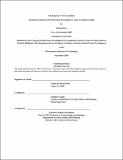The emperor's new coastline : an initial framework for real estate investing in a time of climate change
Author(s)
Hare, Daniel(Daniel J.)
Download1227098955-MIT.pdf (5.055Mb)
Other Contributors
Massachusetts Institute of Technology. Center for Real Estate. Program in Real Estate Development.
Advisor
Jennifer Cookke.
Terms of use
Metadata
Show full item recordAbstract
This thesis investigates the scientific underpinnings of climate change, its physical manifestations, the complications society faces in adapting to this phenomenon and its likely impact on real estate investment values. It concludes by proposing an initial investment framework for real estate investors concerned with climate change. This framework highlights non-traditional due diligence considerations and asserts that probabilistic valuation methods allow for more accurate asset underwriting. The first chapter is structured as a general primer on climate change and includes references for those who would like additional reading on its science. The second chapter describes the geophysical effects of climate change. The intent here is to provide enough background for readers to understand its causes and potential severity. The third chapter covers how geopolitical actors are responding to a warming world and introduces important macroeconomic trends. The fourth chapter outlines the substantial engineering and insurance challenges ahead and presents cases of societies that have won and lost while dealing with either a changing climate or extreme weather events. The fifth chapter highlights key economic, legal, and demographic research on climate change's impacts to date and those that are likely to occur going forward. The purpose of these chapters is to provide historical context for how dramatic atmospheric changes can lead to dramatic economic losses, and to provide some lessons that real estate investors should incorporate when underwriting new opportunities. The conclusion summarizes the first five chapters and offers an initial framework for how real estate investors can incorporate climate change into their underwriting, including a brief review of how property values are currently underwritten using relatively short-term, deterministic discounted cash flows. In closing, I describe how a longer timescale underwriting with additional simulations is beneficial to account for the uncertainties associated with climate change and suggest further research to explore possible market mispricing of assets based on widely divergent upside and downside skews given likely future climates.
Description
Thesis: S.M. in Real Estate Development, Massachusetts Institute of Technology, Program in Real Estate Development in conjunction with the Center for Real Estate, September, 2020 Cataloged from student-submitted PDF of thesis. Includes bibliographical references (pages 107-117).
Date issued
2020Department
Massachusetts Institute of Technology. Center for Real EstatePublisher
Massachusetts Institute of Technology
Keywords
Center for Real Estate. Program in Real Estate Development.